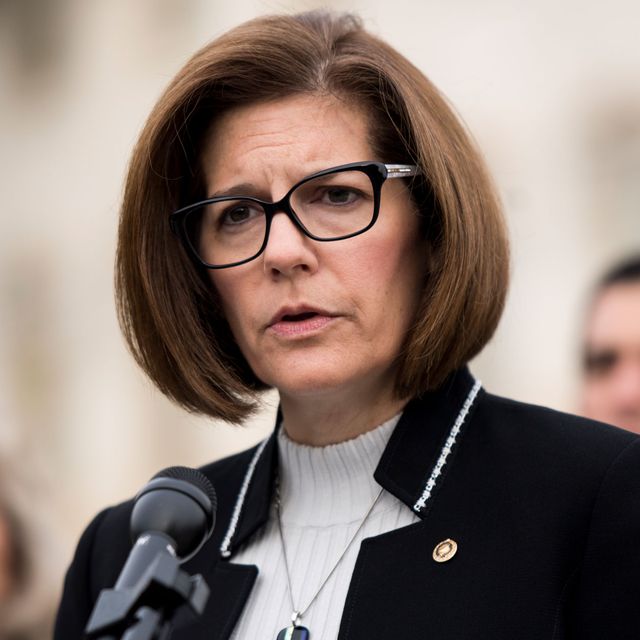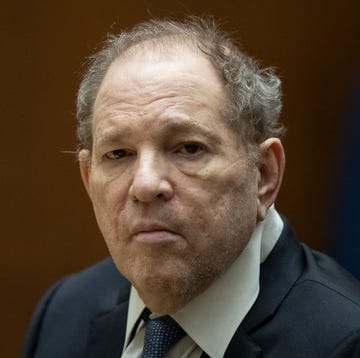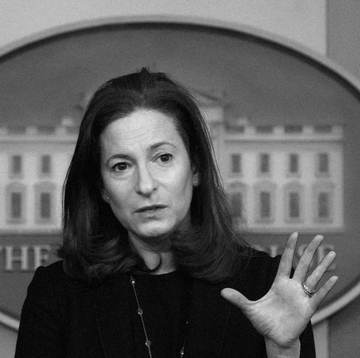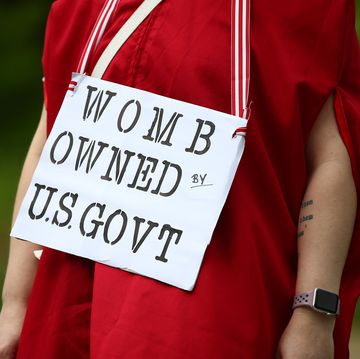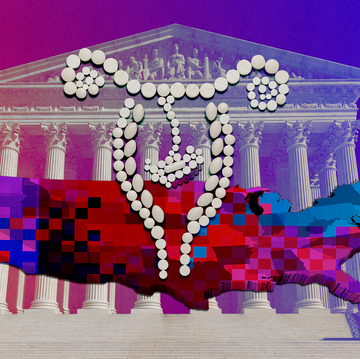On Election Night 2016, as Donald Trump clinched the presidency, Democrats had a silver lining: A record number of women of color were elected to the Senate. One of them was Catherine Cortez Masto, the former attorney general of Nevada, who made history to become the first female senator from the state and the first Latina in the Senate. Just weeks after she was sworn in early last year, she marched in the Women’s March on Washington. On Sunday, she’ll speak at the second iteration of the march, a rally called “Power to the Polls,” in Las Vegas.
Before she gets there, though, Congress faces a tough deadline: It must pass a spending bill by Friday to keep the government open. But she and other Democrats are demanding that any legislation include a deal to protect the 800,000 undocumented immigrants who came to the country as children — known as DREAMers — whose legal status is in limbo.
You'll be speaking at the Women’s March this weekend. What is the importance of having the second iteration of it in your home state of Nevada?
Nevada, I think, is really a microcosm of the rest of the country, the diversity that's there. And by having the women come out and make a point of, “not only are we going to reflect on this year and continue to fight for the issues that we care about, we are actually going to mobilize and we are going to register and we are going to turn our words and our protest into action come 2018 elections” — that's what I've always said from the very beginning. The march was the first step. Now we've got to turn it into action. And our first area where we can make a difference is 2018 in the election.
You were sworn into the Senate a year ago. What's been your biggest accomplishment in the past year?
I was sworn in January 3. [On] January 4, this administration wanted to repeal the Affordable Care Act and take health care away from millions of Americans, and my first vote was to protect that health care. We continued down that path, right? One of the first executive orders was to criminalize immigrants, and one of my first pieces of legislation was to rescind the administration's executive order and continue down this path of fighting for immigrants in this country and these families and highlighting who we are. It continues now with fighting for passage of the DREAM Act, fighting for the El Salvadorians in my state who I just met with, these incredible families and these kids, their protected status and keeping them here. Again, fighting against this administration every time they come in and want to divide this country and attack people because the color of their skin, or of their socioeconomic background, you name it. Or their religion.
Unless Congress passes a spending bill this week, the government will shut down on Friday. Some Democrats say they'll oppose any funding bill that doesn't also protect DREAMers. If Congress can't reach an agreement on DACA this week, are you willing to shut down the government?
We are working very hard to ensure we're doing everything to pass the DREAM Act without having to shut down the government. I've been in the room with my colleagues and fighting for and standing up for what we think needs to be part of that negotiation, and challenging it when we think they're wrong on issues that impact immigration in this country. I have been very clear about my position. We are fighting for kids who are incredible members of our community and their families. Immigrants have basically contributed so much to this economy and these families and these kids continue to do so. They're working hard, they're following the law, they are getting an education. They just want to be here for that American Dream and have every opportunity to succeed, no different than many of us in this country, including me. And now we have taken a position where we have to pit them against everybody else in this country. That is wrong. I am tired, and I know my colleagues are, of this administration and the majority of Republicans playing politics with these kids and their families lives. It's got to stop.
But Republicans and Democrats seem to be at an impasse here. We're days away from a potential shutdown. Is there any scenario in which you would, along with your fellow Democrats, allow a short-term spending bill to pass without an immigration deal?
No, I disagree. I don't think we're at an impasse. I think there are Republicans and Democrats who want to get this done. I've met with them, you've seen them, we've been working together. I think it's just a matter of continuing down the path this week of talking and working together to present a bill that we can – we don't need 100 percent support, but a bill that we can pass out of Congress and get to the president. I honestly believe if we were able to do that and Congress was going to take the lead on it and pass this legislation, this president would sign it.
But if it comes down to it, one or the other, you would not vote for a spending bill that did not include protections or codifying DACA?
I will do everything I can to ensure that we are not playing with these individuals’ lives. I am focused on ensuring we pass this legislation, we do everything we can to protect workers. I can't speculate what that vote is ultimately going to look like and I'm not going to. But I can tell you I'm going to stand with DREAMers and their families.
Hardline Republicans have been adamant that any immigration deal must include funding for a border wall. Would you be willing to support legislation that funded "the wall" if it also codified DACA?
Well, first of all, let's keep in mind here, to pass legislation in Congress, we don't need a 100 percent vote. You need to figure out how you get people enough support on compromise legislation to move forward. But I will tell you this. There is concern that I have that when we're talking about a wall itself, it's unnecessary. I've had the opportunity to have the acting director of Customs and Border Patrol on the phone, asking him specifically, the billions of dollars that he wants just for the wall, and questioning it. It is not fiscally prudent. And there's nothing wrong with pushing back on that. Now, with that said, I think Democrats are supportive of border security in general. And I think there is a way that we can compromise and work and talk with our colleagues to ensure that we have a good bill that addresses some border security, but that does not have something like a wall that is unnecessary, that even the Border Patrol says they don't need. And you can't put a wall on 2,000 miles of border between Mexico and Las Vegas. You can't even put a wall on 1,000 miles of it, and the other 1,000, there's already 700 miles of wall there. So yeah, we should be questioning that. It's unreasonable, and doesn't make sense.
So if a wall is on the table, even if the concession is passing DACA, you would not vote for it?
You're simplifying it. I just kind of explained where I would be. I don't think it's necessary. If you're talking about of the 700 miles of fence that's there, that they just need money to maintain that fence, I would support that. But it's not a wall across 2,000 [miles] – it just can't be done. And that to me is part of what's missing here. This president has no idea what he's talking about when he talks about wanting to put a wall on 2,000 miles of border there. He, from my perspective, has really no understanding of what he's talking about. If we're talking about giving our border security the tools they need to enforce the border, I think there's Democrats that understand and would support that.
Last week, President Trump reportedly questioned why the U.S. was “having all these people from shithole countries come here,” referring to African nations. Has that rhetoric doomed an immigration deal?
I hope not, I hope not. What I'm hearing from my colleagues, both Rs and Ds, [is that] this is an important issue for them and they want to get things done. We can figure out, in a room together, in a bipartisan way, what this legislation should look like. We can pass it out and then send it to the president and have him sign it. We did it with sanctions against Russia. This president said he would never sign any sanctions against Russia. And Congress took the lead, we passed bipartisan legislation on sanctions against Russia, and we sent it to the White House and you know what he did? He signed it.
Do you think President Trump is a racist?
I have said this over and over again, the tendencies in this administration and this White House clearly indicate racist intent here. I mean, look at his words and his actions. It's unfortunate. I want a president who is going to unite this country, who is going to fight for everyone, not just some people. That's not what I'm seeing out of this administration. There's no room for racism, discrimination, and hate in this White House.
But does making racist comments, saying racist things as he has in the past and last week, does that make him a racist?
I'm not sure I understand your question.
You said he had made racist comments, you've seen racism from the White House. Does that, in turn, make the president a racist?
What you hear coming out of his mouth and the comments that he is making, sure looks like there's racism, and that there's concerns that he has about people and the color of their skin, absolutely. I don't know how you can parse the two. Words and actions pretty much indicate who that individual is and what they stand for.
Over your first year in office, you've hosted a series of diversity roundtables. What have you learned from those?
I think the people that we hire in government should be just as diverse as the communities we represent. I got here and realized we are lacking in diversity in the staff and the hires that we make here in Congress. So I wanted to reach out to some of the staff that are here and talk to them about barriers that prevent others from coming to work here, and how we can tear down those barriers. I've met with members of the Latino community, African American community, Asian-American community, LGBTQ [community], I've tried to ensure that I'm getting input from various staff at all levels so that we can work together, particularly where I sit on the rules committee, [to] be able to have an impact. Then also talking with Leader Schumer, who has a diversity initiative, to impact change. I think in the hiring, in the internships, in the sharing of resumes — we don't do enough of that. It's not just a checked box. It's a paradigm shift. It is changing who we are, how we are, and how we think every single day.
What's a moment that stands out to you from these discussions?
One of them is interns. [In Congress,] a lot of the internships are unpaid. If you're from socio-economically challenged communities, you can't go without any type of pay. That limits the type of diversity that we are drawing and bringing into Congress. My first initiative that I did, as soon as I found that out, was making sure my office has paid internships so that we can ensure that we're having more of that diverse background coming into Congress.
You were the first female senator from Nevada. If Jacky Rosen wins this fall, Nevada will be one of just a handful of states that has two female senators. What does that mean to you?
It would be fantastic. First of all, let me just say, Jacky Rosen's phenomenal. I've watched her in Congress, I have watched her fight for Nevada, and the people and the businesses and the families there. She would be an incredible asset and voice here in Congress representing Nevada. And then, just in general, having more women. We have [Minnesota Sen.] Tina [Smith] now, who makes it 22. But there's only now 22 women in the U.S. Senate. We have got to change that. We've got an opportunity now to really continue to open those doors for women. And it's going to start this year, in 2018. Look what we've done across the country, not just in the United States Senate. My goodness, in our legislatures, in our local offices. I have seen, including in Nevada, more women coming out and willing to have an impact by running for office and making change. More so than I've ever seen in previous years and previous elections. It's exciting.
What advice would you give to a first-time woman candidate?
That they can do it. I say this to women all the time: If you've got the passion, you believe in making change, and you've got an issue or policy or something that you've want to do, believe in it. Have confidence in yourself. You can do it.
Follow Rebecca on Twitter.

Rebecca Nelson is a magazine writer in New York. Her work has appeared in the Washington Post magazine, GQ, and many other publications.
